The global cognitive agents market is expected to grow from USD 817.8 million in 2025 to approximately USD 26,877.5 million by 2035, recording an absolute increase of USD 26,059.7 million over the forecast period. The market is forecast to expand at a CAGR of 41.8% between 2025 and 2035. The market size is expected to grow by nearly 32.9X during the same period, supported by the rapid adoption of artificial intelligence technologies, increasing demand for intelligent automation solutions, and growing integration of cognitive capabilities across various industry verticals.
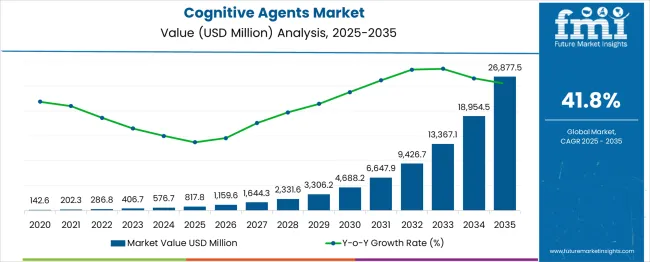
| Item | Value |
|---|---|
| Cognitive Agents Market Value (2025) | USD 817.8 million |
| Cognitive Agents Market Forecast Value (2035) | USD 26,877.5 million |
| Cognitive Agents Market Forecast CAGR | 41.8% |
The global cognitive agents market is projected to experience strong long-term growth over the 2025–2035 period, driven by rising adoption of artificial intelligence, natural language processing, and automation solutions across industries such as banking, healthcare, customer service, and IT. Enterprises are increasingly deploying cognitive agents, including AI-powered virtual assistants and chatbots, to improve operational efficiency, enhance customer experiences, and enable real-time data-driven decision-making. Growth will be supported by demand for intelligent, scalable solutions and the expansion of digital infrastructure in mature markets like North America and Europe, while emerging regions such as Asia-Pacific and Latin America are expected to witness accelerated adoption due to digital transformation initiatives and cloud-based AI deployments.
The market’s long-term trajectory is further strengthened by technological advancements in machine learning, speech recognition, and contextual understanding, enabling cognitive agents to handle complex tasks and deliver personalized experiences. Investments in R&D, strategic partnerships, and integration with enterprise software platforms are expected to be in demand, while the increasing need for predictive analytics and automation in business processes reinforces adoption. Challenges such as data privacy concerns and implementation costs exist, but the market is anticipated to maintain an upward growth trend over the next few years, establishing cognitive agents as an essential element of enterprise digital strategies globally.
Market expansion is being supported by the increasing complexity of business processes requiring intelligent automation and the corresponding need for sophisticated cognitive agents capable of learning, reasoning, and decision-making. Modern cognitive agents leverage advanced machine learning algorithms, natural language processing, and computer vision technologies to understand context, process unstructured data, and interact naturally with humans and systems. The integration of cognitive capabilities enables organizations to automate complex tasks, enhance customer experiences, and improve operational efficiency across various business functions.
The growing focus on digital transformation and intelligent automation across industries is driving demand for cognitive agents that can adapt to changing environments, learn from experience, and provide personalized solutions. Organizations are investing in cognitive agent technologies to reduce operational costs, improve service quality, and gain competitive advantages through enhanced decision-making capabilities. The development of advanced AI frameworks, cloud computing platforms, and specialized hardware is enabling more sophisticated cognitive agent implementations across diverse application scenarios.
The market is segmented by technology, agent system, end-use, and region. By technology, the market is divided into machine learning (ML), natural language processing, computer vision, robotics process automation (RPA), cognitive computing, and others. Based on agent system, the market is categorized into single agent systems and multi-agent systems. In terms of end-use, the market is segmented into healthcare, technology and software, BFSI, retail & e-commerce, manufacturing & logistics, and others. Regionally, the market is divided into North America, Europe, Asia Pacific, Latin America, and Middle East & Africa.
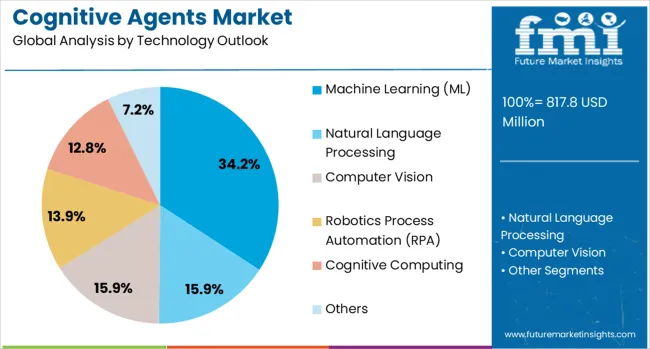
Machine learning (ML) is projected to account for 34.2% of the Cognitive Agents market in 2025. This leading share is supported by the fundamental role of machine learning algorithms in enabling cognitive agents to learn from data, recognize patterns, and make intelligent decisions. The segment benefits from continuous advancement in deep learning frameworks, neural network architectures, and automated machine learning platforms that enhance cognitive agent capabilities. Modern ML-powered cognitive agents demonstrate superior performance in complex tasks including predictive analytics, recommendation systems, and adaptive process automation across various industry applications.
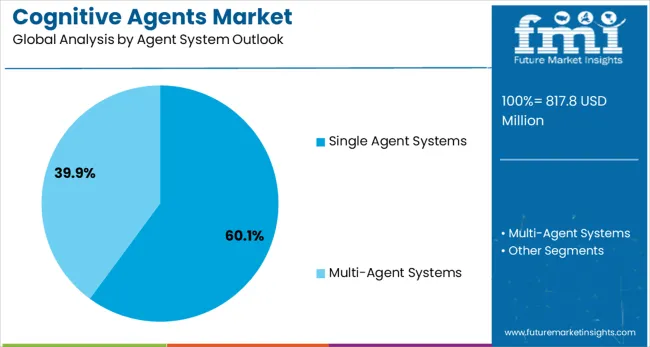
Single agent systems are expected to represent 60.1% of cognitive agent deployment demand in 2025. This dominant share reflects the widespread adoption of individual cognitive agents designed for specific tasks and applications, including virtual assistants, chatbots, and specialized automation systems. The segment benefits from lower implementation complexity, reduced integration requirements, and focused functionality that addresses particular business needs. Single agent systems offer organizations cost-effective entry points for cognitive automation while providing measurable improvements in operational efficiency and customer service capabilities.
Healthcare applications are projected to contribute 44.2% of the market in 2025, representing the largest end-use segment for cognitive agents. The segment encompasses medical diagnosis assistance, patient monitoring systems, drug discovery automation, and clinical decision support applications. Healthcare cognitive agents leverage natural language processing to analyze medical records, computer vision for medical imaging analysis, and machine learning for predictive healthcare analytics. The segment is supported by increasing demand for precision medicine, growing healthcare data complexity, and regulatory initiatives promoting AI adoption in healthcare delivery systems.
The Cognitive Agents market is advancing rapidly due to breakthrough developments in artificial intelligence technologies and growing enterprise demand for intelligent automation solutions. The market faces challenges including data privacy concerns, algorithmic bias issues, and the need for specialized technical expertise in AI development and implementation. Regulatory frameworks and ethical AI guidelines continue to influence cognitive agent development and deployment across different industries and geographical regions.
The growing integration of multi-modal artificial intelligence capabilities is enabling cognitive agents to process and understand multiple types of data simultaneously, including text, images, audio, and video. These advanced systems combine natural language processing, computer vision, and speech recognition technologies to provide more comprehensive and contextual responses to user interactions. Multi-modal cognitive agents enhance user experiences by supporting diverse communication channels and enabling more natural, human-like interactions across various application scenarios and business processes.
Advanced autonomous learning systems are being integrated into cognitive agents to enable continuous improvement and adaptation without human intervention. These systems utilize reinforcement learning, transfer learning, and meta-learning techniques to enhance agent performance over time, adapt to new environments, and acquire new capabilities through experience. Autonomous learning capabilities enable cognitive agents to maintain effectiveness in dynamic environments, reduce maintenance requirements, and provide increasingly sophisticated solutions as they accumulate operational experience and domain knowledge.
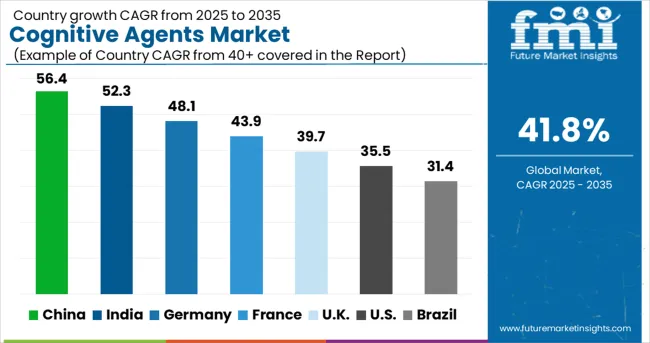
| Countries | CAGR (%) |
|---|---|
| China | 56.4% |
| India | 52.3% |
| Germany | 48.1% |
| France | 43.9% |
| United Kingdom | 39.7% |
| United States | 35.5% |
| Brazil | 31.4% |
The global cognitive agents market is projected to grow at a CAGR of 42% between 2025 and 2035. China leads this expansion with a 56.4% CAGR, supported by rapid adoption of AI-driven solutions, increasing enterprise automation, and integration of cognitive technologies across industries. India follows at 52.3%, driven by growing demand for AI-based customer service platforms, smart assistants, and business process automation. Germany shows growth at 48.1%, emphasizing AI research, enterprise deployment of cognitive agents, and digital innovation. France records 43.9%, fueled by adoption of intelligent virtual assistants and AI-enabled analytics. The UK grows at 39.7%, focusing on enterprise AI integration and customer experience enhancement. The USA stands at 35.5%, reflecting expansion in AI-powered platforms and smart agent applications, while Brazil follows at 31.4%, influenced by rising digital adoption and interest in automated cognitive solutions. The report covers an in-depth analysis of 40+ countries, the top-performing OECD countries are highlighted below.
The cognitive agents market in China is projected to grow at a CAGR of 56.4% from 2025 to 2035, driven by rapid adoption of AI-powered customer engagement and intelligent automation platforms. Enterprises in e-commerce, banking, telecom, and healthcare are increasingly deploying virtual assistants and chatbots to streamline customer interactions, improve efficiency, and reduce operational costs. Integration with natural language processing, machine learning, and predictive analytics enables highly personalized experiences. Domestic tech giants and startups are innovating rapidly, offering both cloud-based and on-premise solutions. Government policies supporting AI infrastructure, digital transformation, and research initiatives further accelerate adoption. Cognitive agents are applied not only in customer support but also in employee assistance systems, supply chain optimization, and internal workflow automation. Multilingual and voice-enabled platforms allow enterprises to cater to diverse user bases across regions, increasing reach and service quality.
The cognitive agents market in India is anticipated to grow at a CAGR of 52.3% from 2025 to 2035, fueled by rising adoption of AI virtual assistants and cognitive platforms in BFSI, IT services, and retail sectors. Enterprises are implementing cognitive agents to automate repetitive tasks, optimize workflows, and deliver predictive insights. Cloud-based deployment is enabling SMEs and startups to access advanced AI solutions with minimal upfront costs. Multilingual capabilities are critical to serving India’s diverse population, while integration with analytics tools allows for personalized experiences. Cognitive agents are gaining traction in healthcare for telemedicine, patient engagement, and appointment management. Collaborations between domestic AI startups and global cloud providers are accelerating enterprise adoption. The market is also expanding in HR, IT support, and internal knowledge management, improving operational efficiency across organizations.
The cognitive agents market in Germany is projected to expand at a CAGR of 48.1% from 2025 to 2035, led by enterprise adoption of AI-driven virtual assistants and intelligent process automation. Industries such as automotive, manufacturing, and banking are leveraging cognitive agents to optimize workflows, reduce costs, and deliver personalized customer experiences. NLP, predictive analytics, and real-time monitoring enhance operational decision-making. Regulatory compliance, including GDPR, shapes deployment and solution design. Hybrid models combining cloud and on-premise platforms are preferred for scalability and data security. Partnerships between domestic startups and global technology providers are fostering innovation in intelligent assistants, voice-enabled bots, and domain-specific solutions. Cognitive agents are increasingly deployed in internal knowledge management and enterprise resource planning, improving operational efficiency and supporting strategic initiatives.
The cognitive agents market in France is anticipated to rise at a CAGR of 43.9% from 2025 to 2035, supported by growing adoption of AI-powered chatbots, virtual assistants, and intelligent automation across finance, retail, and healthcare. Enterprises are using cognitive agents to automate repetitive tasks, improve operational efficiency, and enhance customer interactions. Integration with NLP, machine learning, and predictive analytics allows personalized experiences and data-driven insights. Voice-enabled assistants are gaining prominence for customer support, smart office environments, and e-commerce. Startups and global technology providers are developing localized solutions that comply with GDPR and other regulations. Cognitive agents are also applied internally for HR, IT support, and knowledge management, driving cost reductions and improved efficiency. Multilingual platforms enhance accessibility, while innovative AI-driven tools expand applications across enterprise functions.
The cognitive agents market in the United Kingdom is projected to rise at a CAGR of 39.7% from 2025 to 2035, driven by enterprise adoption in banking, healthcare, retail, and telecom sectors. AI-powered cognitive agents are deployed to automate support, provide predictive insights, and deliver personalized customer interactions. Cloud-based platforms allow scalable deployment across SMEs and large enterprises, while integration with NLP and analytics ensures intelligent decision-making. Regulatory compliance with GDPR and cybersecurity standards shapes solution adoption. Collaboration between startups and global technology providers fuels innovation in conversational AI, virtual assistants, and process automation platforms. Cognitive agents are increasingly used in telemedicine, financial advisory, HR, and knowledge management, enhancing operational efficiency and customer experience.
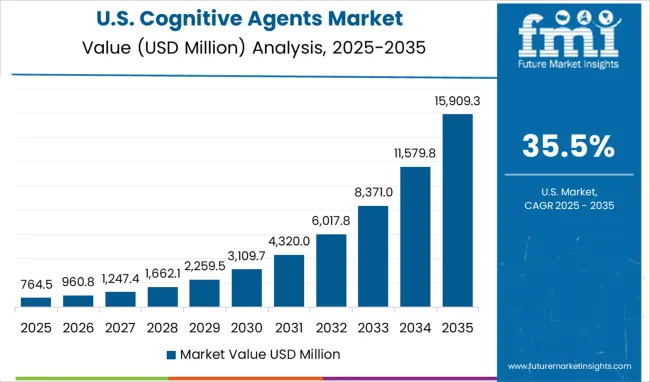
The cognitive agents market in the United States is forecasted to grow at a CAGR of 35.5% from 2025 to 2035, supported by enterprise adoption across BFSI, healthcare, IT, and retail sectors. AI-powered virtual assistants, chatbots, and intelligent automation platforms are implemented to reduce operational costs, optimize workflows, and provide personalized customer engagement. Integration with NLP, machine learning, and predictive analytics enables real-time insights and automated decision-making. Both cloud-based and hybrid deployment models are widely adopted for flexibility and scalability. The competitive landscape is shaped by collaborations between global tech giants and innovative startups providing domain-specific solutions. Cognitive agents are increasingly applied in internal IT support, HR systems, knowledge management, and customer-facing interactions, expanding adoption across enterprise functions.
The cognitive agents market in Brazil is anticipated to grow at a CAGR of 31.4% from 2025 to 2035, fueled by adoption of AI-powered virtual assistants, chatbots, and process automation in finance, retail, and telecommunications. Enterprises leverage cognitive agents to improve customer service, reduce response times, and streamline internal workflows. Cloud-based deployment allows scalable adoption by SMEs, while hybrid models ensure security and flexibility. Multilingual solutions are essential for serving Brazil’s diverse population. Startups and technology providers are innovating in domain-specific cognitive agents for banking, retail, and healthcare applications. Internal enterprise adoption in HR, IT support, and knowledge management is expanding, improving operational efficiency, and reducing manual workloads. Compliance with data privacy and security regulations is influencing deployment strategies.
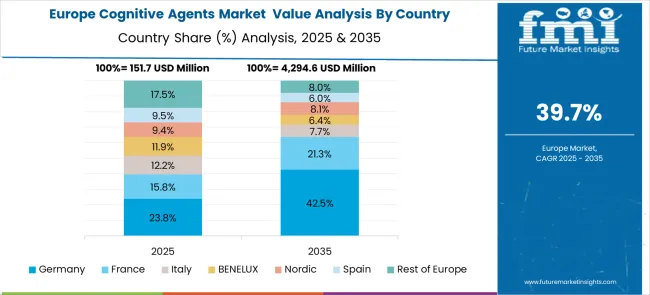
The cognitive agents market in Europe is projected to grow from USD 151.7 million in 2025 to USD 4,294.6 million by 2035, registering a CAGR of 39.7% over the forecast period. Germany is expected to maintain its leadership with 23.8% share in 2025, increasing to 42.5% by 2035. France accounts for 15.8% in 2025, rising to 21.3% in 2035, while Italy holds 11.9% in 2025 and 7.7% in 2035. The BENELUX region represents 9.4% in 2025, declining to 6.4% in 2035. Nordic countries contribute 9.5% in 2025 and 6.1% in 2035. Spain holds 9.2% in 2025, reducing to 6.0% in 2035, while the Rest of Europe accounts for 17.5% in 2025 and 8.0% in 2035.
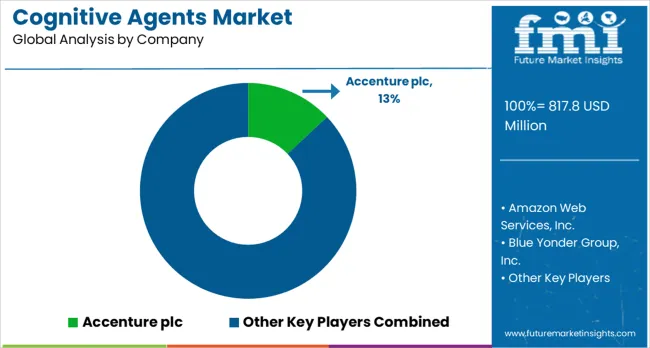
Competition is intense among global technology providers, specialized AI platform developers, and consulting firms delivering AI-driven solutions. Companies are investing heavily in advanced machine learning (ML) research, natural language processing (NLP) capabilities, computer vision technologies, and cognitive computing platforms to develop intelligent agents capable of understanding, reasoning, and interacting with humans in a more natural and context-aware manner. Strategic partnerships, technology acquisitions, and ecosystem development are key mechanisms for companies to strengthen their competitive positioning, accelerate innovation, and expand market reach.
Global consulting and technology services firms such as Accenture leverage AI and cognitive agent capabilities to deliver end-to-end digital transformation services. Their offerings include enterprise-grade implementation, consulting, and integration of AI agents into business processes for customer engagement, analytics, and workflow automation. Cloud-based platforms such as AWS (Amazon Web Services) provide scalable ML infrastructure and NLP services, enabling enterprises to deploy conversational AI, virtual assistants, and automated agent systems efficiently. Blue Yonder Group Inc. focuses on cognitive agents designed for supply chain optimization and retail intelligence, offering predictive analytics and decision support functionalities to improve operational efficiency and demand forecasting.
Cognigy GmbH develops conversational AI platforms with sophisticated cognitive agent functionalities for customer service automation, enhancing user experience through multi-channel engagement and context-aware responses. Cognizant Technology Solutions provides development and deployment services for enterprise clients, combining AI strategy consulting with implementation support across sectors such as healthcare, finance, and manufacturing.
Leading technology giants like Google LLC offer comprehensive cognitive computing platforms that integrate machine learning, NLP, and AI-driven analytics to build intelligent virtual agents. IBM Corporation delivers Watson-powered cognitive agent solutions for business process automation, customer engagement, and analytics-driven decision-making. Microsoft, Nuance Communications Inc., and SAS Institute Inc. offer specialized AI agent platforms, advanced analytics tools, and developer frameworks to facilitate enterprise adoption and integration of cognitive technologies globally.
| Items | Values |
|---|---|
| Quantitative Units | USD 817.8 million |
| Technology | Machine Learning (ML), Natural Language Processing, Computer Vision, Robotics Process Automation (RPA), Cognitive Computing, Others |
| Agent System | Single Agent Systems, Multi-Agent Systems |
| End-Use | Healthcare, Technology and Software, BFSI, Retail & E-Commerce, Manufacturing & Logistics, Others |
| Regions Covered | North America, Europe, Asia Pacific, Latin America, Middle East & Africa |
| Country Covered | United States, Germany, India, China, United Kingdom, Japan, Brazil |
| Key Companies Profiled | Accenture, AWS (Amazon Web Services), Blue Yonder Group Inc., Cognigy GmbH, Cognizant Technology Solutions Corporation, Google LLC, IBM Corporation, Microsoft, Nuance Communications Inc., SAS Institute Inc. |
| Additional Attributes | Dollar sales by technology, agent system, and end-use, regional demand trends across North America, Europe, and Asia-Pacific, competitive landscape with established technology companies and emerging AI startups, buyer preferences for single versus multi-agent systems, integration with machine learning and natural language processing technologies, innovations in cognitive computing platforms and autonomous learning capabilities, and adoption of advanced multi-modal AI systems with enhanced decision-making features for comprehensive business process automation and customer interaction solutions. |
The global cognitive agents market is estimated to be valued at USD 817.8 million in 2025.
The market size for the cognitive agents market is projected to reach USD 26,877.5 million by 2035.
The cognitive agents market is expected to grow at a 41.8% CAGR between 2025 and 2035.
The key product types in cognitive agents market are machine learning (ml), natural language processing, computer vision, robotics process automation (rpa), cognitive computing and others.
In terms of agent system outlook, single agent systems segment to command 60.1% share in the cognitive agents market in 2025.






Full Research Suite comprises of:
Market outlook & trends analysis
Interviews & case studies
Strategic recommendations
Vendor profiles & capabilities analysis
5-year forecasts
8 regions and 60+ country-level data splits
Market segment data splits
12 months of continuous data updates
DELIVERED AS:
PDF EXCEL ONLINE
Cognitive Supply Chain Market Forecast Outlook 2025 to 2035
Cognitive Computing Market Size and Share Forecast Outlook 2025 to 2035
Cognitive Impairment Biomarkers Market Size and Share Forecast Outlook 2025 to 2035
Cognitive Electronic Warfare Market Size and Share Forecast Outlook 2025 to 2035
Cognitive Network Market Size and Share Forecast Outlook 2025 to 2035
Cognitive Analytics Market Size and Share Forecast Outlook 2025 to 2035
Cognitive Diagnostics Market Analysis & Forecast by Diagnosis, Indication, End User and Region through 2035
Cognitive health supplements market analysis by product type, form, sales channel, functionality, and by region – Growth, trends, and Forecast from 2025 to 2035
Cognitive Neuroscience Market Overview – Trends & Research Insights 2024-2034
Cognitive Assessment and Training Market Report – Trends & Growth Forecast 2024-2034
Cognitive Data Management Market
Cognitive Security Market
Cognitive Systems Spending Market Report – Growth & Forecast 2016-2026
Content Analytics Discovery And Cognitive Systems Market Size and Share Forecast Outlook 2025 to 2035
Content Analytics, Discovery, and Cognitive Software Market Analysis by Product Type, End User, and Region through 2035
Matting Agents Market Size and Share Forecast Outlook 2025 to 2035
Healing Agents Market (Skin Repair & Soothing Actives) Market Size and Share Forecast Outlook 2025 to 2035
Foaming Agents Market Size and Share Forecast Outlook 2025 to 2035
Firming Agents Botox-Like Market Size and Share Forecast Outlook 2025 to 2035
Heating Agents Market Size and Share Forecast Outlook 2025 to 2035

Thank you!
You will receive an email from our Business Development Manager. Please be sure to check your SPAM/JUNK folder too.
Chat With
MaRIA